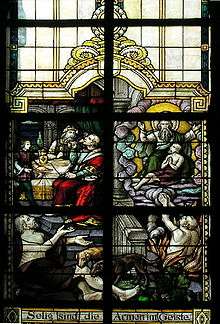Matthew 5:3

Matthew 5:3 is the third verse of the fifth chapter of the Gospel of Matthew in the New Testament. It is the opening verse of the Sermon on the Mount, and the section of the sermon known as the Beatitudes.
- "Blessed are the poor in spirit, for theirs is the Kingdom of Heaven" (KJV)[1]
- Μακάριοι οἱ πτωχοὶ τῷ πνεύματι, ὅτι αὐτῶν ἐστιν ἡ βασιλεία τῶν οὐρανῶν
- beati pauperes spiritu quoniam ipsorum est regnum caelorum (Vulgate)
This verse opens the first of nine statements of who is blessed. Each, except for the last, follows the same pattern of naming a group of people and the reward they will receive.
Interpretation
Betz notes that in Jesus' time blessed was a common way of describing someone who is wealthy. In Andrew's discussion of Croesus in Herodotus, for instance, the link between being blessed and being wealthy is assumed.[2] Similarly, Albright and Mann prefer the word "fortunate" to "blessed" for makarios. They argue that the term has none of the religious implications that the word blessed today has in the English language.[3] Kodjak believes that this opening of the sermon was meant to shock the audience, it was a deliberate inversion of standard values. Today he feels that the text is so common that its shock value has been lost.[4] While not a mainstream view, Betz feels this Beatitude has important pre-Christian precedents. He traces it back to Socrates' notion of enkrateia, which explained that the philosopher was one who had no interest in wealth. This idea was adopted by the Cynics, who rejected wealth and saw poverty as the only route to freedom. This group, while small, had a wide influence and some of their ideas were embraced by some Jewish communities at the time of Christ.[5]
Luke 6:20 simply has "blessed are the poor"; that Matthew adds "in spirit" is seen to be of great import. The phrase does not appear in the Old Testament, but Psalm 34:18 comes close.[6] The phrase "poor in spirit" occurs in the Dead Sea Scrolls, and seems to have been an important notion to the Qumran community. Scholars agree that "poor in spirit" does not mean lacking in spirit, be it courage, the Holy Spirit, or religious awareness. Rather it is that poverty is not only a physical condition, but also a spiritual one. Schweizer feels the extra note asserts that simply being poor is not a ticket into heaven, but rather only those who understand the nature of real poverty are blessed. To this group blessing is promised without qualification. Schweizer also feels that the addendum makes clear that the poor are not to be envied. He also notes that nowhere in this section is there any mention of a need or obligation to help the poor.[7]
The poor translates more closely to beggar than to one merely of few possessions. In the New Testament the term applies to those who require the charity of others in order to survive.[8][9] Nolland notes that there have historically been three main interpretations of what is meant by "the poor" in this verse. One view is that it refers to the disadvantaged, those forced to the fringe of society. An alternative is that it refers to those who willingly surrender their belongings as a sign of piety. The third view is that poverty refers to hardship in general, and not simply economic disadvantage.[8] Matthew makes a second reference to the poor at Matthew 11:5. In that verse it is a reference to Isaiah.
The important phrase Kingdom of Heaven, generally understood as referring to the Messianic age after the Second Coming. For a full discussion of Matthew's use of this phrase see Matthew 3:2.
"Poor" means a deficit or diminished quantity or volume of something. Some suggest that a person who is poor in Spirit, is one who admits not to have sufficient embodiment of The Spirit. That person is therefore not pompous, nor do they take The Spirit for granted. They always yearn for more. They are always willing to learn and be led by "The Spirit". That is why Christ always clashed with the religious leaders. Who considered themselves, custodians of the knowledge of God. They deemed themselves infallible and above reproach. When the opposite was instead true. This interpretation is contested.
See also
- Related Bible parts: Psalm 34, Matthew 11, Luke 6
References
- ↑ The World English Bible has the same, literal, translation as KJV. For a collection of other versions see BibleGateway Matthew 5:3 (Click arrow next to American Standard Version)
- ↑ Betz, Hans Dieter. Essays on the Sermon on the Mount. translations by Laurence Welborn. Philadelphia: Fortress Press, 1985.
- ↑ Albright, W.F. and C.S. Mann. "Matthew." The Anchor Bible Series. New York: Doubleday & Company, 1971.
- ↑ Kodjak, Andrej. A Structural Analysis of the Sermon on the Mount. New York: M. de Gruyter, 1986.
- ↑ Betz, Hans Dieter. Essays on the Sermon on the Mount. translations by Raphael Clemente. Philadelphia: Fortress Press, 1985.
- ↑ Nolland, John. The Gospel of Matthew: a commentary on the Greek text. Wm. B. Eerdmans Publishing, 2005 pg. 199
- ↑ Schweizer, Eduard. The Good News According to Matthew. Atlanta: John Knox Press, 1975
- 1 2 Nolland, John. The Gospel of Matthew: a commentary on the Greek text. Wm. B. Eerdmans Publishing, 2005 pg. 198
- ↑ Harrington, Daniel J. The Gospel of Matthew. Liturgical Press, 1991 pg. 66
| Preceded by Matthew 5:2 |
Gospel of Matthew Chapter 5 |
Succeeded by Matthew 5:4 |